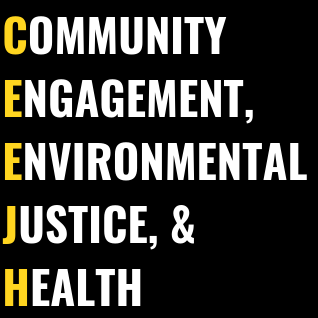Environmental Racism in Uniontown, AL
Board members of Black Belt Citizens Fighting for Health and Justice join community members in demonstration against environmental injustices in Uniontown, AL.
Uniontown is a small city in Perry County, Alabama—approximately 70 miles west of the state’s capital, Montgomery, and 50 miles south of Tuscaloosa—that has been suffering differential burden of air, water, and soil contamination due to two distinct pollution sources: The Arrowhead Landfill and The Southeastern Cheese Corporation cheese manufacturing plant. Possible hazardous exposures associated with the Arrowhead Landfill’s operations include diesel exhaust constituents (e.g., particulate matter (PM), black carbon, and volatile organic compounds (VOCs)) and coal fly ash containing several toxic heavy metals such as arsenic, mercury, and cadmium.
A wealth of scientific literature has shown relationships between exposure to the aforementioned pollutants and increased risk of respiratory and cardiovascular health outcomes including deaths, hospital admissions, and emergency department visits, decreased lung function and increases in respiratory disease and exacerbation of asthma in children. The cheese manufacturing plant is the source of noxious odors and fumes reported to have caused nausea, headaches, sleep deprivation among Uniontown residents. Furthermore, the cheese manufacturing plant is accused of overloading the town’s already antiquated wastewater system through unlawful waste discharge from the plant, resulting in massive soil and water contamination.
Considering that Uniontown’s population is almost 85% African-American with an average per capita income of $12,295 and an estimated 48.8% of the persons living below the poverty line, the negative impacts facing residents constitute an environmental justice crisis. Ongoing community efforts in seeking redress for these issues via lawsuits and other litigative action have not been very successful.
Partnering with local community advocates Black Belt Citizens Fighting for Health and Justice, the CEEJH Lab has joined a multi-university academic research team that includes Yale University to provide technical assistance to local residents. The team will assist with the implementation of the community-based participatory research (CBPR) framework to improve environmental health literacy and inpower residents through citizen science training and research on air quality monitoring, soil sampling, water quality testing, and environmental risk reduction.




